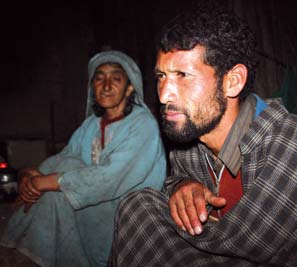
But for Zoon and Khatoon, who find life in Brenwar fast and unattractive, the only refuge during summers is Heyjin, a vast meadow dotted with pine trees and wild bushes.
Since their childhood, as far as they can remember, Zoon and Khatoon were been part of all the entourages that were sent to Heyjin, to look after cows and sheep.
“There is nothing much to do here. I just love the air and the surroundings. It keeps me alive from inside,” says Zoon.
With the first rays of sun both Zoon and Khatoon get up to feed their cattle. Then after having a modest breakfast of bread made of corn-floor with salted pink tea, they leave towards the jungle to collect firewood. “Firewood is as important as oxygen here. You can survive without food for a few days but not without fire,” informs Khatoon. Khatoon is an expert in lighting fire. It is her job to keep the flame burning. “I don’t know why we are here. I don’t even sell milk. Staying here is a way of life thought it earns us nothing in terms of money,” says Zoon. “Once you get used to nature you cannot go back to what you call normal life,” says Khatoon. “I like to be alone.” But Zoon and Khatoon are not alone!
An Unexpected Visitor
This year Zoon and Khatoon had some unexpected guests at their Kotha. It was Yibel Wagey’s family that has come to stay with them. Zoon and Khatoon had given them two rooms – one for the family and other for their expecting animals and new mothers.
Wagey is a professional shepherd who earns his living by taking care of the sheep owned by people from across Kashmir. This year Wagey and his family are travelling with 650 sheep (including 35 he owns), 32 horses (including two which the family uses for transportation of essentials from one place to another), 30 goats and 20 buffalos.
Only fifteen days back Wagey and his family had returned from Korag-Discal, a high altitude grazing field which is near Poonch.
Every year on 21st of March, Wagey collects sheep, goat, horses and buffalos from across Kashmir against a set amount for a period of eight and half months.

Pic: Bilal Bahadur
“In March, we go straight to Korag-Discal with our herd. It is pleasant there during that time. But after August it gets extremely cold in Korag-Discal,” says Mushtaq.
Wagey who is in his early 70’s has three sons and one daughter. While Wagey and his youngest son Mushtaq Ahmad Chopan, 21, travel together all the time, his other two sons stay back at Brenwar and take care of the small family farmland. This year Wagey took his teenage daughter along just to make her familiar with the family profession. “It is important to pass on the legacy,” said Wagey.
Ever since their arrival at Heyjin, every night after dinner Wagey, his wife Mukhti, younger son Mushtaq and their teenage daughter would sit down around a small oil lamp along with Zoon and Khatoon and talk about life far from the civilization. “Living a nomad’s life teaches you a lot. You start respecting the elements of nature in an altogether different way,” says Mushtaq, while sipping the traditional pink tea. “We cannot afford to go on rampage like those who live in cities. Our livelihood is dependent on preservation of these pastures,” adds his father Wagey.
As night matured Wagey and his elder son Mushtaq, got ready for the work, while Mukhti and her daughter retired for the night. It was a cold night. The sky was full of stars. As far as eyes could see there were sheep sitting under the naked sky like white carpet spread on the green turf. But Mushtaq paid no heed to the starts or the wind that was now blowing in his face. He took out a torch, a small canvas sheet, and a warm blanket to cover himself with and sat down near his herd of sheep. His back was guarded by two of his faithful friends: German shepherd dogs named sheru and kalu. After making himself comfortable, he whistled in the darkness to check on the dogs who responded with a bark or two.
















Such a beautiful and touching story of friendship n survival. I like the way writer has narrated the story. Simply amazing. Thanks kashmirlife team for highlighting this side of Kashmir for its readers.
Thank you sir this story is very interested